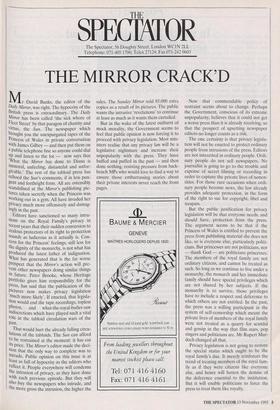SPECTATOR
The Spectator, 56 Doughty Street, London WC1N 2LL Telephone: 071-405 1706; Telex 27124; Fax 071-242 0603
THE MIRROR CRACK'D
Mr David Banks, the editor of the Daily Mirror, was right. The hypocrisy of the British press is extraordinary. The Daily Mirror has been called 'the sick whore of Fleet Street' by that paragon of chastity and virtue, the Sun. The newspaper which brought you the unexpurgated tapes of the Princess of Wales in private conversation With James Gilbey — and then put them on a public telephone line so anyone could dial Up and listen to the lot — now says that 'What the Mirror has done to Diana is immoral, unfeeling, distasteful and unfor- givable.' The rest of the tabloid press has echoed the Sun's comments, if in less pun- gent and forthright form. All are ostensibly scandalised at the Mirror's publishing pic- tures taken secretly when the Princess was working out in a gym. All have invaded her Privacy much more offensively and damag- ingly in the past. . Editors have sanctioned so many intru- sions on the Royal Family's privacy in recent years that their sudden conversion to zealous protectors of its right to protection sounds as ludicrous as it actually is. Con- cern for the Princess' feelings, still less for the dignity of the monarchy, is not what has Produced the latest lather of indignation. What has generated that is the far worse Prospect that the Mirror's action will pre- vent other newspapers doing similar things in future. Peter Brooke, whose Heritage Portfolio gives him responsibility for the Press, has said that the publication of the Pictures now makes privacy legislation Much more likely'. If enacted, that legisla- tion would end the tape recordings, topless Photos, and what-the-royal-butler-saw Indiscretions which have played such a vital role in the tabloid circulation wars of the
past
That would hurt the already falling circu- lations of the tabloids. The Sun can afford to be restrained at the moment: it has cut Its price. The Mirror's editor made the deci- ion that the only way to complete was to Intrude. Public opinion on this issue is at least as full of hypocrisy as the editors who reflect it. People everywhere will condemn the intrusion of privacy, as they have done With each previous episode. But they will also buy the newspapers who intrude, and the more gross the intrusion, the higher the
sales. The Sunday Mirror sold 85,000 extra copies as a result of its pictures. The public wants the intrusive 'revelations' to continue at least as much as it wants them curtailed.
But in the wake of the latest outburst of mock morality, the Government seems to feel that public opinion is now forcing it to proceed with privacy legislation. Most min- isters realise that any privacy law will be a legislative nightmare and increase their unpopularity with the press. They have huffed and puffed in the past — and then done nothing, resisting pressure from back- bench MPs who would love to find a way to ensure those embarrassing stories about their private interests never reach the front pages. Now that commendable policy of restraint seems about to change. Perhaps the Government, conscious of its extreme unpopularity, believes that it could not get a worse press than it is already receiving, so that the prospect of upsetting newspaper editors no longer counts as a risk.
The one certainty is that privacy legisla- tion will not be enacted to protect ordinary people from intrusions of the press. Editors are not interested in ordinary people. Ordi- nary people do not sell newspapers. No journalist is going to go to the trouble and expense of secret filming or recording in order to capture the private lives of nonen- tities. For those rare occasions when ordi- nary people become news, the law already provides adequate protection, in the form of the right to sue for copyright, libel and trespass.
But the public justification for privacy legislation will be that everyone needs, and should have, protection from the press. The argument seems to be that if the Princess of Wales is entitled to prevent the press from publishing material she does not like, so is everyone else, particularly politi- cians. But princesses are not politicians, nor — thank God — are politicians princesses. The members of the royal family are not ordinary citizens, and cannot be treated as such. So long as we continue to live under a monarchy, the monarch and her immediate family should have special privileges which are not shared by her subjects. If the monarchy is to survive, those privileges have to include a respect and deference to which others are not entitled. In the past, the press was a willing participant in the system of self-censorship which meant the private lives of members of the royal family were not treated as a quarry for scandal and gossip in the way that film stars, pop singers and politicians are. Mr Rupert Mur- doch changed all that.
Privacy legislation is not going to restore the special status which ought to be the royal family's due. It merely reinforces the trend of treating members of the royal fam- ily as if they were citizens like everyone else, and hence will hasten the demise of the deference essential to the institution. But it will enable politicians to force the press to treat them like royalty.


























































 Previous page
Previous page